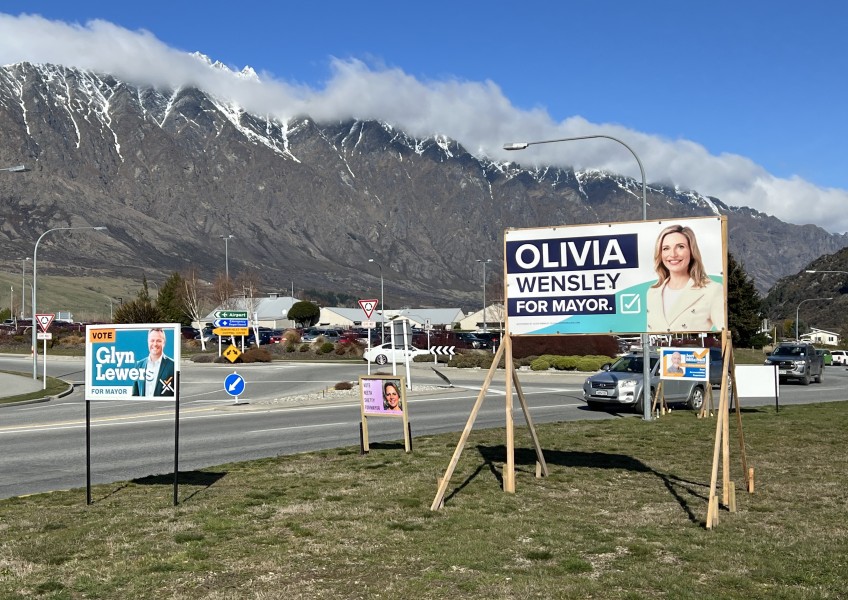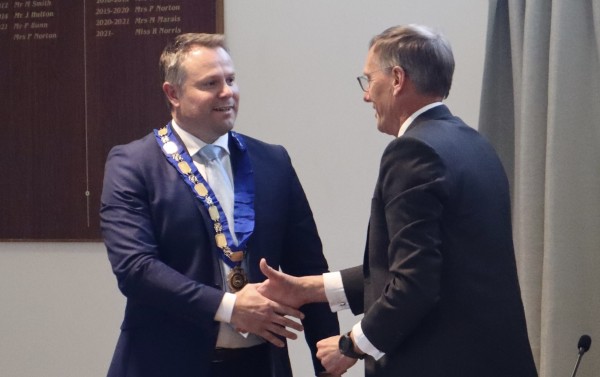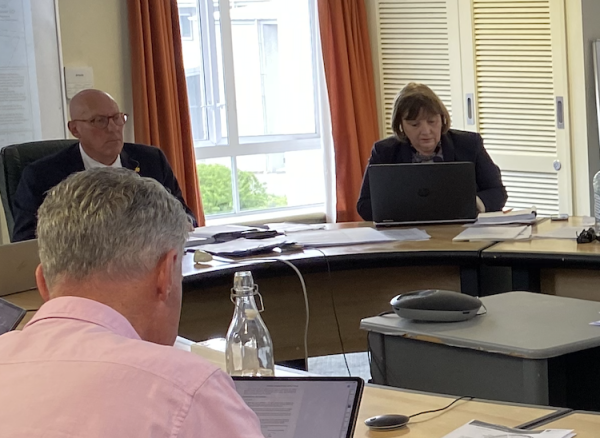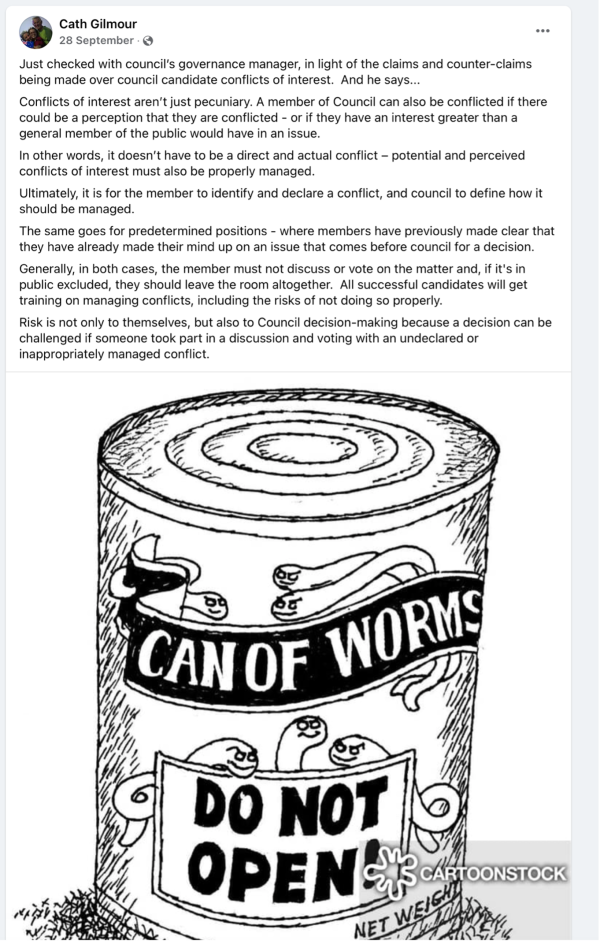
Were QLDC managers drawn into election campaign dirty politics?
Editorial/Analysis
The Queenstown Lakes District Council has found itself involved in two situations where the outcome of the recent local elections may have been affected by council managers.
Local election rules make it very clear, for obvious reasons, that council staff and managers need to stay fully distanced from the democratic process and not get involved in the selection of a new mayor and councillors.
However, mayoral candidate Olivia Wensley has lodged a police complaint regarding potential election interference, with most of those questions now sitting on the desk of QLDC's Electoral Officer Jane Robertson.

Glyn Lewers (left) was elected as mayor, but he used a non-existent "conflict" document, attributed to council CEO Mike Theelen (right) to justify an attack on Olivia Wensley.
The newly elected members, including mayor Lewers, become the bosses and employers of council staff underlining why it is so important for QLDC managers to avoid getting involved with, or influencing, local elections.
The first situation arose when mayoral candidate Glyn Lewers claimed that a competing candidate Olivia Wensley would be conflicted by links with an historic leaky building case. Even though emotions ran high during the campaign, Wensley was not a party to legal action over the case could not be held responsible for the situation arising in the first place, 17 years ago when she was at secondary school and involved her future father in law who she was yet to meet.
As Crux reported at the time, Mr Lewers cited a QLDC document, a list of conflicted parties, that he said proved that Olivia Wensley was conflicted. But then it emerged that that document did not exist, as confirmed by the mayor and QLDC CEO.
Then, despite requests from QLDC Electoral Officer Jane Robertson, Mr Lewers continued to publish his false claim. Mr Lewers told Crux in an interview that the list of conflicted names had been supplied to him by QLDC CEO Mike Theelen on behalf of the council’s legal team.
Crux asked Mrs Robertson why Mr Lewers, who has been a councillor and council committee member for the past three years, would have made the conflict claim, linked to CEO Theelen, against Olivia Wensley if it was not true.
She provided this reply:

Electoral Officer Jane Robertson (right) - Lewers' statements re: non-existent conflict list "simply an instance of typical election campaigning."
“This is simply an instance of typical election campaigning and Mr Theelen has previously advised Mrs Wensley no such list exists. Your questions about comments attributed to Mr Lewers should be directed to him.”
Crux approached mayor Lewers who did not reply.
The second instance of council involvement came when former councillor and community lobbyist Cath Gilmour published a statement attributed to QLDC ‘s comms and governance manager Naell Crosby-Roe.
Ms Gilmour published and promoted her social media post, titled “Can of Worms” that claimed to show that the QLDC had a view that Mrs Wensley, because of her family's leaky building links, would be conflicted and excluded from parts of council meetings.
Both Ms Gilmour and Mr Crosby-Roe characterised their comments as “general” and not linked to Olivia Wensley. However an official information request by Mrs Wensley shows that Ms Gilmour specified leaky building issues in her approach to Mr Crosby-Roe and Mr Crosby-Roe specified the same leaky building reference in his reply.
Mrs Wensley was the only candidate affected by leaking building claims and counter claims, with the Wensley “conflict” issue dominating the majority of election campaign media and social media coverage.
Ms Gilmour is refusing to release her QLDC question(s) telling Crux that they were “not relevant” and refusing to explain why her public account of Mr Crosby-Roe’s comments was paraphrased in spite of being attributed to him. Ms Gilmour hung up during her call with Crux, refusing to answer further questions on the subject.
Here is what Mr Crosby-Roe told Ms Gilmour, as part of a general reply on the rules surrounding council conflicts of interest:
“As you raise it specifically, items such as the leaky buildings matters would be dealt with largely with public excluded due to the legal and commercial nature of such discussions and any member declaring an interest would need to leave the room.”
Ms Gilmour presented her paraphrased version of Mr Crosby-Roe’s comments (you can read the full actual reply here) saying it was an “innocuous precis of what conflicts are” and that her published comments were “all confirmed by council’s governance manager.”

Cath Gilmour's post of September 28 - these words were not the same as those actually provided by Mr Crosby-Roe
Ms Gilmour's post was widely read as relating to Olivia Wensley's situation and resulted in an unpleasant public exchange between Gilmour and Wensley focussed on the appropriateness or otherwise of a senior QLDC manager being "quoted" to support a broad and subjective view of "conflict."

The full Gilmour post - did it damage the Wensley campaign and did its reliance on a QLDC manager's comments interfere with the election process?
Crux journalists are required to go through a QLDC communications process that includes only a relatively junior staff member who then goes – behind closed doors – to get comment from different council managers. That comment is then provided to Crux and other media without us having any direct contact with the manager to whom the comments are attributed.

Council communications and Governance manager Naell Crosby-Roe - claims his Wensley comments to Ms Gilmour were just a normal reply to a member of the public.
We asked both Mr Crosby-Roe and electoral Officer Jane Robertson why he had allowed himself to be drawn into a difficult and contentious election issue and allowed his comments to be represented by a lobbyist as “council confirmation” of a conflict linked to Mrs Wensley.
This was Mr Crosby-Roe’s reply.
“It is not uncommon for members for the public to contact staff throughout the organisation for information, advice or assistance. This does not alter the pathway for media enquiries via Sam or the on-call communications person.”
Jane Robertson told Crux:
“The information provided by Mr Crosby-Roe was appropriate and publicly available information, and has been provided in full to Mrs Wensley. Mrs Wensley made an official information request for Ms Gilmour’s email and in reply QLDC provided a summary of the email which the Ombudsman deems an appropriate disclosure of information.”
“Ms Gilmour declined to give permission for her email to be released. It is not for me to comment on the social media activity of a member of the public.”
The situation now is that Mrs Wensley’s police complaint depends on answers being provided to her by the QLDC’s Jane Robertson.
Olivia Wensley told Crux that her police complaint and election interference concerns centre on the two key issues.
"Did Mike Theelen give a document to Glyn Lewers that was then used to attack me. Did Niall Crosby-Roe make a public statement that was then used to attack me."
It seems likely that the line between “dirty politics” and the sometimes murky business of “election campaigning” may be – just like the conflict issue itself – in the eye of the beholder.
What is definite is that the QLDC election campaign of 2022 will do absolutely nothing to encourage "non-political" people to stand for local office nor it will it do much to restore faith in our council’s ability to win the trust of the community.





























